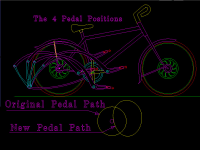People have tried to make the bicycle more efficient and easier to ride for centuries. Some have succeeded, some have failed. The failures have been when someone has tried to get more torque to the rear wheel with a given input. This is where I have succeeded.
This rocker crank extension is the 3rd generation of crank extensions. First was an orbiting crank extension. It did not increase torque. The 2nd was the telescoping crank extension. Although it did increase torque at the rear wheel, it was not the 34% I expected from pretests. There also were dirt and lube concerns with the linear bearings.
The rocker crank extension basically extends your pedal out front only during the down stroke thereby adding leverage without increasing the stroke significantly. The crank extension is tied to a rocker arm at the rear for stability. The added torque at the rear wheel allows you to go faster than before or to pedal easier while keeping up with your friends.
To manufacture bicycles using this technology, you must extend the wheel base of the bike to prevent your toes from hitting the front wheel. The front part of the crank extension should be steel and have double bearings where it mounts to the end of the crank. The back part of the crank extension can be an arched carbon fiber tube with a clevis at the end and be connected to the vertical rocker arm. The vertical rocker arm should be a thin carbon fiber plate with a bearing at each end and attached to the bike frame at the bottom.
Like this entry?
-
About the Entrant
- Name:Donald Stone
- Type of entry:individual
- Patent status:none





